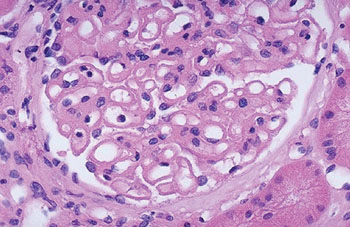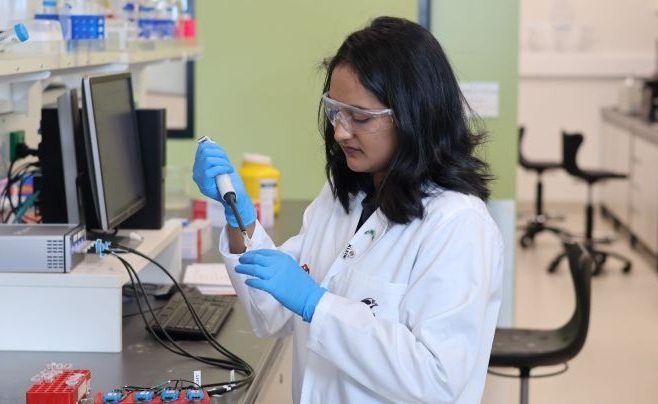Noninvasive Test Helps Identify Cause of Specific Kidney Disease
|
By LabMedica International staff writers Posted on 02 Jul 2014 |

Image: Histopathology of a kidney showing membranous glomerulonephritis (Photo courtesy of University of Utah).
The first test that can help determine a specific type of kidney disease, called membranous glomerulonephritis (MGN) has been authorized for marketing.
Membranous glomerulonephritis (MGN) is a chronic kidney disease that causes damage to the glomeruli, which are the cluster of tiny tufts of capillary blood vessels in the kidney that filter the blood and begin the process to remove waste and excess fluid from the blood.
The US Food and Drug Administration (Silver Springs, MD, USA) reviewed a clinical study of 560 blood samples of which 275 samples were obtained from patients with presumed primary MGN (pMGN), while 285 samples were obtained from patients diagnosed with other kidney diseases including secondary MGN (sMGM) and autoimmune diseases, not including pMGN, that can damage the kidney, like lupus erythematosus.
The EUROIMMUN Anti- PLA2R IFA blood test (Euroimmun US Inc.; Morris Plains, NJ, USA) detects if a patient has an antibody, a protein molecule the body’s immune system produces, that is specific to pMGN. The test was able to detect pMGN in 77% of the presumed pMGN samples, and gave a false positive result in less than 1% of the other disease samples. Notably, the test was helpful in distinguishing between pMGN from sMGN in most of the patients. The test should not be used alone to diagnose pMGN. Additional information, including patient symptoms and other laboratory tests, should always be considered when making a diagnosis of pMGN. A biopsy of the kidney is needed to confirm the diagnosis of pMGN. A negative result from the test does not rule out a diagnosis of pMGN.
Alberto Gutierrez, PhD, director of the Office of In Vitro Diagnostics at the FDA, said, “Treatment of MGN depends on the underlying cause of the disease. This test can help patients get a timely diagnosis for their MGN and aid with earlier treatment.” The FDA reviewed the EUROIMMUN Anti- PLA2R IFA blood test through its de novo classification process, a regulatory pathway for some novel low- to moderate-risk medical devices that are first-of-a-kind. The test should not be used to monitor the stage of disease or the response to treatment.
Symptoms of MGN include swelling, high cholesterol, high blood pressure and increased predisposition to blood clots. Over time, usually 10 to 20 years, some people with MGN proceed to kidney failure and require a kidney transplant. MGN affects mostly adult, Caucasian men. About 85% of MGN cases are caused by the body’s immune system mistakenly attacking healthy kidney tissue, which is one of the leading causes of kidney disease in adults.
Related Links:
US Food and Drug Administration
Euroimmun US Inc.
Membranous glomerulonephritis (MGN) is a chronic kidney disease that causes damage to the glomeruli, which are the cluster of tiny tufts of capillary blood vessels in the kidney that filter the blood and begin the process to remove waste and excess fluid from the blood.
The US Food and Drug Administration (Silver Springs, MD, USA) reviewed a clinical study of 560 blood samples of which 275 samples were obtained from patients with presumed primary MGN (pMGN), while 285 samples were obtained from patients diagnosed with other kidney diseases including secondary MGN (sMGM) and autoimmune diseases, not including pMGN, that can damage the kidney, like lupus erythematosus.
The EUROIMMUN Anti- PLA2R IFA blood test (Euroimmun US Inc.; Morris Plains, NJ, USA) detects if a patient has an antibody, a protein molecule the body’s immune system produces, that is specific to pMGN. The test was able to detect pMGN in 77% of the presumed pMGN samples, and gave a false positive result in less than 1% of the other disease samples. Notably, the test was helpful in distinguishing between pMGN from sMGN in most of the patients. The test should not be used alone to diagnose pMGN. Additional information, including patient symptoms and other laboratory tests, should always be considered when making a diagnosis of pMGN. A biopsy of the kidney is needed to confirm the diagnosis of pMGN. A negative result from the test does not rule out a diagnosis of pMGN.
Alberto Gutierrez, PhD, director of the Office of In Vitro Diagnostics at the FDA, said, “Treatment of MGN depends on the underlying cause of the disease. This test can help patients get a timely diagnosis for their MGN and aid with earlier treatment.” The FDA reviewed the EUROIMMUN Anti- PLA2R IFA blood test through its de novo classification process, a regulatory pathway for some novel low- to moderate-risk medical devices that are first-of-a-kind. The test should not be used to monitor the stage of disease or the response to treatment.
Symptoms of MGN include swelling, high cholesterol, high blood pressure and increased predisposition to blood clots. Over time, usually 10 to 20 years, some people with MGN proceed to kidney failure and require a kidney transplant. MGN affects mostly adult, Caucasian men. About 85% of MGN cases are caused by the body’s immune system mistakenly attacking healthy kidney tissue, which is one of the leading causes of kidney disease in adults.
Related Links:
US Food and Drug Administration
Euroimmun US Inc.
Latest Pathology News
- Engineered Yeast Cells Enable Rapid Testing of Cancer Immunotherapy
- First-Of-Its-Kind Test Identifies Autism Risk at Birth
- AI Algorithms Improve Genetic Mutation Detection in Cancer Diagnostics
- Skin Biopsy Offers New Diagnostic Method for Neurodegenerative Diseases
- Fast Label-Free Method Identifies Aggressive Cancer Cells
- New X-Ray Method Promises Advances in Histology
- Single-Cell Profiling Technique Could Guide Early Cancer Detection
- Intraoperative Tumor Histology to Improve Cancer Surgeries
- Rapid Stool Test Could Help Pinpoint IBD Diagnosis
- AI-Powered Label-Free Optical Imaging Accurately Identifies Thyroid Cancer During Surgery
- Deep Learning–Based Method Improves Cancer Diagnosis
- ADLM Updates Expert Guidance on Urine Drug Testing for Patients in Emergency Departments
- New Age-Based Blood Test Thresholds to Catch Ovarian Cancer Earlier
- Genetics and AI Improve Diagnosis of Aortic Stenosis
- AI Tool Simultaneously Identifies Genetic Mutations and Disease Type
- Rapid Low-Cost Tests Can Prevent Child Deaths from Contaminated Medicinal Syrups
Channels
Clinical Chemistry
view channel
New PSA-Based Prognostic Model Improves Prostate Cancer Risk Assessment
Prostate cancer is the second-leading cause of cancer death among American men, and about one in eight will be diagnosed in their lifetime. Screening relies on blood levels of prostate-specific antigen... Read more
Extracellular Vesicles Linked to Heart Failure Risk in CKD Patients
Chronic kidney disease (CKD) affects more than 1 in 7 Americans and is strongly associated with cardiovascular complications, which account for more than half of deaths among people with CKD.... Read moreMolecular Diagnostics
view channel
Period Blood Test for HPV Could Replace Cervical Screening
Cervical cancer screening relies heavily on clinician-collected samples, yet many women do not attend screening appointments due to fear of pain, concerns about privacy, stigma, or lack of awareness.... Read more
New Genetic Tools Improve Breast Cancer Risk Prediction for African American Women
Despite advances in genetic testing, breast cancer death rates remain disproportionately high among women of African ancestry. Existing risk prediction tools often fail to accurately assess risk in this... Read moreHematology
view channel
New Guidelines Aim to Improve AL Amyloidosis Diagnosis
Light chain (AL) amyloidosis is a rare, life-threatening bone marrow disorder in which abnormal amyloid proteins accumulate in organs. Approximately 3,260 people in the United States are diagnosed... Read more
Fast and Easy Test Could Revolutionize Blood Transfusions
Blood transfusions are a cornerstone of modern medicine, yet red blood cells can deteriorate quietly while sitting in cold storage for weeks. Although blood units have a fixed expiration date, cells from... Read more
Automated Hemostasis System Helps Labs of All Sizes Optimize Workflow
High-volume hemostasis sections must sustain rapid turnaround while managing reruns and reflex testing. Manual tube handling and preanalytical checks can strain staff time and increase opportunities for error.... Read more
High-Sensitivity Blood Test Improves Assessment of Clotting Risk in Heart Disease Patients
Blood clotting is essential for preventing bleeding, but even small imbalances can lead to serious conditions such as thrombosis or dangerous hemorrhage. In cardiovascular disease, clinicians often struggle... Read moreMicrobiology
view channel
Comprehensive Review Identifies Gut Microbiome Signatures Associated With Alzheimer’s Disease
Alzheimer’s disease affects approximately 6.7 million people in the United States and nearly 50 million worldwide, yet early cognitive decline remains difficult to characterize. Increasing evidence suggests... Read moreAI-Powered Platform Enables Rapid Detection of Drug-Resistant C. Auris Pathogens
Infections caused by the pathogenic yeast Candida auris pose a significant threat to hospitalized patients, particularly those with weakened immune systems or those who have invasive medical devices.... Read morePathology
view channel
Engineered Yeast Cells Enable Rapid Testing of Cancer Immunotherapy
Developing new cancer immunotherapies is a slow, costly, and high-risk process, particularly for CAR T cell treatments that must precisely recognize cancer-specific antigens. Small differences in tumor... Read more
First-Of-Its-Kind Test Identifies Autism Risk at Birth
Autism spectrum disorder is treatable, and extensive research shows that early intervention can significantly improve cognitive, social, and behavioral outcomes. Yet in the United States, the average age... Read moreTechnology
view channel
Robotic Technology Unveiled for Automated Diagnostic Blood Draws
Routine diagnostic blood collection is a high‑volume task that can strain staffing and introduce human‑dependent variability, with downstream implications for sample quality and patient experience.... Read more
ADLM Launches First-of-Its-Kind Data Science Program for Laboratory Medicine Professionals
Clinical laboratories generate billions of test results each year, creating a treasure trove of data with the potential to support more personalized testing, improve operational efficiency, and enhance patient care.... Read moreAptamer Biosensor Technology to Transform Virus Detection
Rapid and reliable virus detection is essential for controlling outbreaks, from seasonal influenza to global pandemics such as COVID-19. Conventional diagnostic methods, including cell culture, antigen... Read more
AI Models Could Predict Pre-Eclampsia and Anemia Earlier Using Routine Blood Tests
Pre-eclampsia and anemia are major contributors to maternal and child mortality worldwide, together accounting for more than half a million deaths each year and leaving millions with long-term health complications.... Read moreIndustry
view channelNew Collaboration Brings Automated Mass Spectrometry to Routine Laboratory Testing
Mass spectrometry is a powerful analytical technique that identifies and quantifies molecules based on their mass and electrical charge. Its high selectivity, sensitivity, and accuracy make it indispensable... Read more
AI-Powered Cervical Cancer Test Set for Major Rollout in Latin America
Noul Co., a Korean company specializing in AI-based blood and cancer diagnostics, announced it will supply its intelligence (AI)-based miLab CER cervical cancer diagnostic solution to Mexico under a multi‑year... Read more
Diasorin and Fisher Scientific Enter into US Distribution Agreement for Molecular POC Platform
Diasorin (Saluggia, Italy) has entered into an exclusive distribution agreement with Fisher Scientific, part of Thermo Fisher Scientific (Waltham, MA, USA), for the LIAISON NES molecular point-of-care... Read more


















